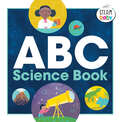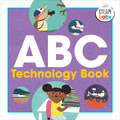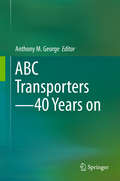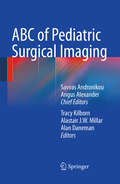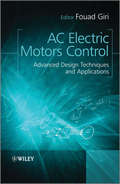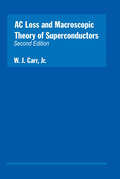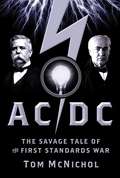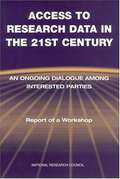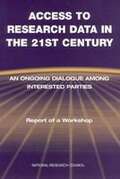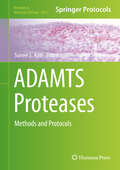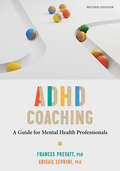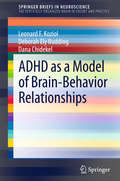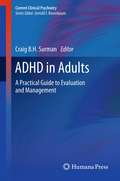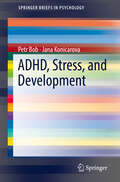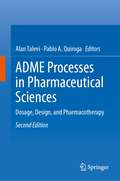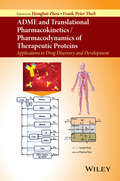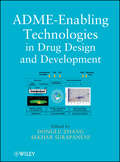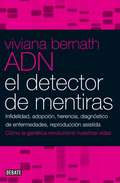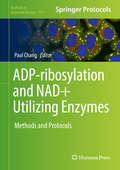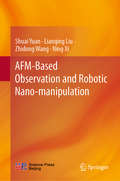- Table View
- List View
ABC Science Book (STEAM Baby for Infants and Toddlers)
by Anjali JoshiABC learning through the power of S.T.E.A.M. for ages 0 to 3Give your little scientist a jump-start with this fun, inspiring way to master their ABCs. From astronaut to zoologist, ABC Science Book introduces young children, up to age 3, to basic scientific concepts and careers with each letter of the alphabet.This S.T.E.A.M.-themed ABC book for kids features:Levels of discovery—Explore a tiered learning approach that grows with your child; focus first on letters, then on words, and then on understanding concepts.Colorful images—Rich and vibrant illustrations add to the learning and keep your child engaged.Full S.T.E.A.M. ahead—Encourage a lifelong love of learning with all the books in the S.T.E.A.M. Baby series.ABC Science Book makes learning the alphabet a fun, exciting adventure for any toddler.
ABC Technology Book (STEAM Baby for Infants and Toddlers)
by Sage FranchFuel your toddler's ABC learning through the power of S.T.E.A.M. Give your little technologist a jump-start with this fun, inspiring way to master their ABCs. From Automation to Zip Compression, ABC Technology Book introduces toddlers to basic technology concepts with each letter of the alphabet. This S.T.E.A.M.-themed ABC technology book for kids features: Levels of discovery—Explore a tiered learning approach that grows with your child. Focus first on letters, then on words, and then on understanding concepts. Colorful images—This ABC technology book has rich and vibrant illustrations that add to the learning and will keep your child engaged. Full S.T.E.A.M. ahead—Encourage a lifelong love of learning with all the books in the S.T.E.A.M. Baby Series. Out now: ABC Science Book, ABC Engineering Book. Coming Soon: ABC Arts Book, ABC Math Book. ABC Technology Book makes learning the alphabet a fun, exciting adventure for any toddler.
ABC Transporters - 40 Years on: 40 Years On
by Anthony M. GeorgeThis book provides new structural, biochemical, and clinical information on ABC transporters. The authors explore and describe the state of the art of research, knowledge, and prospects for the future for this important family of proteins. The first ABC transporter was discovered in 1973 and was named P-glycoprotein. It elicits resistance to cytotoxic drugs, chiefly in human tumours, within which chemotherapy failure is observed in about 50% of cases. Together with its complex pharmacology, and even a suspected role in Alzheimer's disease, this ABC transporter still eludes a clinical solution to its multidrug resistance property. ABC transporters are integral membrane active proteins and they belong to one of the largest protein families across all species. Their myriad roles encompass the import or export of a diverse range of allocrites, including ion, nutrients, peptides, polysaccharides, lipids, and xenobiotics. They are of major medical importance with many members elaborating multidrug resistance in bacteria, fungi, yeast, parasites, and humans. Other ABC transporters are involved in a number of inherited diseases, including cystic fibrosis, macular degeneration, gout, and several other metabolic disorders
ABC of Pediatric Surgical Imaging
by Angus Alexander Tracy Kilborn Alastair J. Millar Savvas Andronikou Alan DanemanThis book has been designed to serve as a quick reference that will assist in decision making. The book is ordered alphabetically according to diagnoses. The intention is that the clinician consults the information on a suspected diagnosis, and then considers the listed surgical and radiological differential diagnoses. A total of 80 common diagnoses are covered. For each diagnosis, the left-hand page presents information relevant to the surgeon, while the right-hand page is designed for the radiologist. The information for the surgeon comprises clinical insights, including symptoms, warnings, controversies, other important facts, and the surgical differential diagnosis. The radiologist is provided with lists of the primary and follow-on investigations, the imaging findings, and helpful tips, as well as the radiological differential diagnosis. Informative supporting images are included for each diagnosis. The authors are all experts in their fields, with extensive practical experience.
AC Electric Motors Control
by Fouad GiriThe complexity of AC motor control lies in the multivariable and nonlinear nature of AC machine dynamics. Recent advancements in control theory now make it possible to deal with long-standing problems in AC motors control. This text expertly draws on these developments to apply a wide range of model-based control designmethods to a variety of AC motors.Contributions from over thirty top researchers explain how modern control design methods can be used to achieve tight speed regulation, optimal energetic efficiency, and operation reliability and safety, by considering online state variable estimation in the absence of mechanical sensors, power factor correction, machine flux optimization, fault detection and isolation, and fault tolerant control.Describing the complete control approach, both controller and observer designs are demonstrated using advanced nonlinear methods, stability and performance are analysed using powerful techniques, including implementation considerations using digital computing means.Other key features:* Covers the main types of AC motors including triphase, multiphase, and doubly fed induction motors, wound rotor, permanent magnet, and interior PM synchronous motors* Illustrates the usefulness of the advanced control methods via industrial applications including electric vehicles, high speed trains, steel mills, and more* Includes special focus on sensorless nonlinear observers, adaptive and robust nonlinear controllers, output-feedback controllers, fault detection and isolation algorithms, and fault tolerant controllersThis comprehensive volume provides researchers and designers and R&D engineers with a single-source reference on AC motor system drives in the automotive and transportation industry. It will also appeal to advanced students in automatic control, electrical, power systems, mechanical engineering and robotics, as well as mechatronic, process, and applied control system engineers.
AC Loss and Macroscopic Theory of Superconductors
by W.J. Carr Jr.Through the 'magic' of averages it is shown that Maxwell's equations can be used in a simple way to describe filamentary composites as well as pure bulk superconductors. The second edition of AC Loss and Macroscopic Theory of Superconductors, like the first edition, is written for both physicists and engineers. It starts with a rigorous and partial
AC/DC
by Tom McnicholAC/DC tells the little-known story of how Thomas Edison wrongly bet in the fierce war between supporters of alternating current and direct current. The savagery of this electrical battle can hardly be imagined today. The showdown between AC and DC began as a rather straightforward conflict between technical standards, a battle of competing methods to deliver essentially the same product, electricity. But the skirmish soon metastasized into something bigger and darker. In the AC/DC battle, the worst aspects of human nature somehow got caught up in the wires; a silent, deadly flow of arrogance, vanity, and cruelty. Following the path of least resistance, the war of currents soon settled around that most primal of human emotions: fear. AC/DC serves as an object lesson in bad business strategy and poor decision making. Edison's inability to see his mistake was a key factor in his loss of control over the ?operating system? for his future inventions?not to mention the company he founded, General Electric.
ACCESS TO RESEARCH DATA IN THE 21ST CENTURY: An Ongoing Dialogue Among Interested Parties Report of a Workshop
by Science Technology Law PanelIn the years since the Shelby Amendment, scientists, industry, and policy makers have struggled over how the public’s new right of access should be applied to scientific data. There is loose agreement that research data should be accessible, but wide disagreement over the “depth” to which the public has such a right. The National Academies’ Science, Technology, and Law Program held a workshop to explore the mounting tensions in the federal regulatory process between the need to provide access to research data and the need to protect the integrity of the research process. The workshop provided a picture of the debate arising from passage of the Shelby Amendment and the resulting OMB revisions of Circular A-110. This report is a summary of the workshop.
ACCESS TO RESEARCH DATA IN THE 21ST CENTURY: An Ongoing Dialogue Among Interested Parties Report of a Workshop
by National Research Council"An enthralling, multilayered story. "--RT Book Reviews on Deliver Me From Darkness It's Forbidden for a Warrior of the Light to Love a Creature of the Dark. . . Valin has never quite fit in with the rest of the Paladin warriors. His power to manipulate shadow has always put him at odds with their purpose of using heavenly Light to eradicate evil. His warrior brothers have no idea how close he is to being lost to his dark nature. But Maybe He Was Never All That Light to Begin With. . . When Valin meets the vampire Gabriella, she awakens within him something he thought long buried. But as he watched Gabriella's need for vengeance to drag her down into the same dark hell that he's living, he knows his only chance at redemption is bringing her out of the dark. . . "Intriguing paranormal creatures and torment abound. . . the sex is great, and the ending is fun. "--Booklist on Deliver Me from Temptation
ACRP Report 63: Measurement of Gaseous HAP Emissions from Idling Aircraft as a Function of Engine and Ambient Conditions
by Transportation Research BoardThe findings of this project are summarized as follows:<P><P> 1. Temperature dependence: VOC emission indices are approximately twice as high under cold conditions (-8°C to 0°C) as they are at 15°C for the CFM56-7B24.<P> 2. Fuel flow rate dependence: For the engine states that are likely to be most representative of the operational aircraft taxiway engine state, the VOC emission indices for the CFM56-7B24 are approximately 40% greater than the ICAO certification engine state (7% thrust).<P> 3. VOC speciation: The composition profile of the exhaust is constant. The ratios of individual VOCs (e.g., formaldehyde to 1,3-butadiene) remain constant over all thrust settings and temperatures encountered. The first two findings are thus expected to be applicable to all VOCs measured, with the exception that there is a dependence of benzene emissions on fuel aromatic content.
ACT Test Prep Flash Cards: Biology Review (Exambusters ACT Workbook #11 of 13)
by Ace Inc.450 questions. Topics: Cells, Biochemistry and Energy, Evolution, Kingdoms: Monera, Fungi, Protista, Plants, Animals; Human: Locomotion, Circulation, Immunology, Respiration, Excretion, Digestion, Nervous System <P><P><i>Advisory: Bookshare has learned that this book offers only partial accessibility. We have kept it in the collection because it is useful for some of our members. Benetech is actively working on projects to improve accessibility issues such as these.</i><P><P>
ACT Test Prep Flash Cards: Chemistry Review (Exambusters Workbook #12 of 13)
by Ace Inc.700 questions. Essential chemistry formulas and concepts.<P><P> Topics: Metric System, Matter, Atoms, Formulas, Moles, Reactions, Elements, Chemical Bonds, Phase Changes, Solutions, Reaction Rates, Acids and Bases, Oxidation and Reduction, Introduction to Organic Chemistry. <P><P><i>Advisory: Bookshare has learned that this book offers only partial accessibility. We have kept it in the collection because it is useful for some of our members. Benetech is actively working on projects to improve accessibility issues such as these.</i><P><P>
ACT Test Prep Flash Cards: Physics Review (Exambusters Workbook #13 of 13)
by Ace Inc.600 questions. Sample problems. Topics: Metric System, Motion and Forces, Work and Energy, Fluids, Sound, Light and Optics, Static Electricity, D.C. and A.C. Circuits, Magnetism. <P><P><i>Advisory: Bookshare has learned that this book offers only partial accessibility. We have kept it in the collection because it is useful for some of our members. Benetech is actively working on projects to improve accessibility issues such as these.</i><P><P>
ADAMTS Proteases: Methods and Protocols (Methods in Molecular Biology #2043)
by Suneel S. ApteThis volume provides a variety of methods used to analyze ADAMTS proteases and ADAMTS-like proteins, including their structure, substrate profile, tissue and cell distribution, post-translational modification and biological pathways. Chapters discuss genetic, cell biology, biochemical and proteomics techniques applicable to the analysis of all the members of the ADAMTS superfamily. Written in the highly successful Methods in Molecular Biology series format, chapters include introductions to their respective topics, lists of the necessary materials and reagents, step-by-step, readily reproducible laboratory protocols, and tips on troubleshooting and avoiding known pitfalls. Cutting-edge and thorough, ADAMTS Proteases: Methods and Protocols is a valuable tool for researchers to study both simple and sophisticated methodologies that are often difficult to locate in primary research literature.
ADHD Coaching: A Guide for Mental Health Professionals
by Frances Prevatt Abigail L. LevriniThis updated edition of ADHD Coaching: A Guide for Mental Health Professionals describes the foundational principles as well as step-by-step guidance for teaching adults, college students, and adolescents how to survive and thrive with ADHD. Coaching specifically targets the core impairments of ADHD, such as planning, time management, goal setting, organization, and problem solving, as well as academic, vocational, emotional, and interpersonal life difficulties. Chapters offer concrete advice for gathering information, conducting the initial intake, establishing goals and objectives, and working through all stages of coaching, along with helpful forms and a wide range of additional resources. The authors also discuss the business side of coaching, and how to develop one&’s practice. Richly detailed case studies illustrate how to help clients who present with a variety of ADHD symptoms. Each case study highlights different aspects of the coaching process and includes a description and background history of the client, and selected session dialogue interwoven with discussion of the case material. The book is designed to help facilitate skill building and work with clients to improve outcomes.
ADHD as a Model of Brain-Behavior Relationships (SpringerBriefs in Neuroscience)
by Leonard F. Koziol Deborah Ely Budding Dana ChidekelADHD as a Model of Brain-Behavior Relationships Leonard F. Koziol, Deborah Ely Budding, and Dana Chidekel Series Title: Springer Briefs in Neuroscience Subseries: The Vertically Organized Brain in Theory and Practice It's been a basic neurological given: the brain does our thinking, and has evolved to do the thinking, as controlled by the neocortex. In this schema, all dysfunction can be traced to problems in the brain's lateral interactions. But in scientific reality, is this really true? Challenging this traditional cortico-centric view is a body of research emphasizing the role of the structures that control movement-the brain's vertical organization-in behavioral symptoms. Using a well-known, widely studied disorder as a test case, ADHD as a Model of Brain-Behavior Relationships offers an innovative framework for integrating neuroscience and behavioral research to refine diagnostic process and advance the understanding of disorders. Identifying a profound disconnect between current neuropsychological testing and the way the brain actually functions, this revision of the paradigm critiques the DSM and ICD in terms of the connectedness of brain structures regarding cognition and behavior. The authors argue for a large-scale brain network approach to pathology instead of the localizing that is so common historically, and for an alternate set of diagnostic criteria proposed by the NIMH. Included in the coverage: The diagnosis of ADHD: history and context. ADHD and neuropsychological nomenclature Research Domain Criteria: a dimensional approach to evaluating disorder The development of motor skills, executive function, and a relation to ADHD The role of the cerebellum in cognition, emotion, motivation, and dysfunction How large-scale brain networks interact Heralding a more accurate future of assessment, diagnosis, and treatment of neurodevelopmental disorders, ADHD as a Model of Brain-Behavior Relationships represents a major step forward for neuropsychologists, child psychologists, and psychiatrists, or any related profession interested in a neuroscientific understanding of brain function.
ADHD in Adults: A Practical Guide to Evaluation and Management (Current Clinical Psychiatry #0)
by Craig B.H. SurmanADHD in Adults: A Practical Guide to Evaluation and Management is the product of a unique collaboration of international specialists. This volume offers easy-to-read guidance, and includes checklists, rating scales and treatment planning tools. It was designed for a broad audience of caregivers working in diverse settings, including psychiatrists, social workers, primary care physicians, nurse specialists and psychologists. The authors are highly acclaimed clinicians, investigators and educators. They offer step-by-step guidance for implementation of best practices, drawing from clinical research and their experience treating thousands of patients. They cover diagnosis, treatment planning, and state-of-the-art application of pharmacology, psychotherapy, skill-building, family system and environmental interventions - for both simple and complex cases. The scales and worksheets in this Guide were developed to efficiently facilitate assessment and management. The Editor is an international leader in the field from the Clinical and Research Program in Adult ADHD at Massachusetts General Hospital (MGH) and Harvard Medical School, which has made pioneering and highly cited contributions to the understanding of ADHD. This Guide is a definitive, indispensable resource for all health providers who wish to optimize their approach to adult patients with ADHD.
ADHD, Stress, and Development (SpringerBriefs in Psychology)
by Petr Bob Jana KonicarovaThis first-of-its-kind volume revisits current findings on ADHD in terms of classic thinking on developmental neuropsychology for a more rounded concept of brain disorganization. Insights from Freud, Janet, John Hughlings Jackson, and other pioneers help identify mechanisms (e.g., the primitive reflexes) that can cause children with ADHD to be prone to cognitive dissociation when exposed to stressful environments. The authors’ model of the developing distracted brain pinpoints effects of stress on cognitive and affective functions, most notably attention and memory, and suggests situations in which stimuli may facilitate integration between brain and mind. This expanded knowledge opens out new educational possibilities for vulnerable students as well as new opportunities for therapeutic breakthroughs for children with ADHD. Included in the coverage: · Definition, diagnosis, and epidemiology of Attention Deficit and Hyperactivity Disorder. · Historical and recent research on ADHD. · Attentional functions, executive dysfunctions, and stress, implications for ADHD. · Neural dissolution, dissociation, and stress in ADHD. · Attention, brain-mind integration and ADHD. · Implications for education and therapy of ADHD children. ADHD, Stress, and Development ably synthesizes past and current understanding into a robust framework with implications for real-world practice. It offers practitioners and researchers new perspectives and future directions in neuropsychology, psychiatry, child and school psychology, and pediatrics.
ADME Processes in Pharmaceutical Sciences: Dosage, Design, and Pharmacotherapy
by Alan Talevi Pablo A. QuirogaAbsorption, Distribution, Metabolism and Excretion (ADME) processes and their relationship with the design of dosage forms and the success of pharmacotherapy form the basis of this upper level undergraduate/graduate textbook. Whereas primarily oriented to Pharmacy students and graduates, it can also be useful for scientist from different fields elated to pharmaceutics and pharmacology. (e.g., material scientists, material engineers, medicinal chemists, physicians) who might be working in a positions in pharmaceutical companies or whose work might benefit from basic training in the ADME concepts and related biological background.Pedagogical features such as objectives, keywords, discussion questions, summaries and case studies are included as teaching tools. This book will provide not only general knowledge on ADME processes but also an updated insight on some hot topics such as drug transporters, multi-drug resistance related to pharmacokinetic phenomena, last generation pharmaceutical carriers (nanopharmaceuticals), in vitro and in vivo bioequivalence studies, biopharmaceuticals, pharmacogenomics, drug-drug and food-drug interactions, in silico and in vitro prediction of ADME properties, or chronopharmacokinetic. In comparison with other similar textbooks, around half of the volume would be focused on the relationship between expanding scientific fields and ADME processes. Each of these burgeoning fields has a separate chapter in the second part of the volume, and is written with experts on the correspondent topic, including industrial scientists and academics from USA and UK.Additionally, each of the initial chapters dealing with the generalities of drug absorption, distribution, metabolism and excretion would include relevant, classic examples related to each topic with appropriate illustrations. ADME Processes and Pharmaceutical Sciences is written as a core textbook for courses on pharmaceutical sciences: pharmacology, pharmacokinetics,drug delivery, biopharmaceutics, drug design and medicinal chemistry courses.
ADME and Translational Pharmacokinetics / Pharmacodynamics of Therapeutic Proteins: Applications in Drug Discovery and Development
by Honghui Zhou Frank-Peter TheilWith an emphasis on the fundamental and practical aspects of ADME for therapeutic proteins, this book helps readers strategize, plan and implement translational research for biologic drugs. • Details cutting-edge ADME (absorption, distribution, metabolism and excretion) and PKPD (pharmacokinetic / pharmacodynamics) modeling for biologic drugs• Combines theoretical with practical aspects of ADME in biologic drug discovery and development and compares innovator biologics with biosimilar biologics and small molecules with biologics, giving a lessons-learned perspective • Includes case studies about leveraging ADME to improve biologics drug development for monoclonal antibodies, fusion proteins, pegylated proteins, ADCs, bispecifics, and vaccines• Presents regulatory expectations and industry perspectives for developing biologic drugs in USA, EU, and Japan• Provides mechanistic insight into biodistribution and target-driven pharmacokinetics in important sites of action such as tumors and the brain
ADME-Enabling Technologies in Drug Design and Development
by Donglu Zhang Sekhar SurapaneniA comprehensive guide to cutting-edge tools in ADME research The last decade has seen tremendous progress in the development of analytical techniques such as mass spectrometry and molecular biology tools, resulting in important advances in drug discovery, particularly in the area of absorption, distribution, metabolism, and excretion (ADME). ADME-Enabling Technologies in Drug Design and Development focuses on the current state of the art in the field, presenting a comprehensive review of the latest tools for generating ADME data in drug discovery. It examines the broadest possible range of available technologies, giving readers the information they need to choose the right tool for a given application, a key requisite for obtaining favorable results in a timely fashion for regulatory filings. With over thirty contributed chapters by an international team of experts, the book provides: A thorough examination of current tools, covering both electronic/mechanical technologies and biologically based ones Coverage of applications for each technology, including key parameters, optimal conditions for intended results, protocols, and case studies Detailed discussion of emerging tools and techniques, from stem cells and genetically modified animal models to imaging technologies Numerous figures and diagrams throughout the text Scientists and researchers in drug metabolism, pharmacology, medicinal chemistry, pharmaceutics, toxicology, and bioanalytical science will find ADME-Enabling Technologies in Drug Design and Development an invaluable guide to the entire drug development process, from discovery to regulatory issues.
ADN. EL DETECTOR DE MENTIRAS (EBOOK)
by Viviana Bernath"A través de la investigación de casos reales, Viviana Bernath aborda, con autoridad y sencillez, un tema crucial de nuestro tiempo: el de las implicaciones psicosociales derivadas del acceso a la información genética. Expresión de un hondo humanismo, su enfoque interesará tanto al lector profano como al especialista sensible a las relaciones entre su quehacer y la comunidad. Al igual que todas las revoluciones del conocimiento que lo precedieron -la de Aristóteles, la de Galileo, la de Newton, la de Darwin, la de Freud, la de Einstein- el descubrimiento del ADN sitúa la existencia humana en un nuevo marco histórico tan cautivante como polémico. Consciente de las consecuencias éticas, subjetivas e interdisciplinarias que entraña el acceso a la información genética, la autora rehúye las racionalizaciones fáciles y cualquier triunfalismo tecnocrático para internarse, con lucidez y cautela, en el territorio brumoso e insoslayable del sentido del conocimiento. ADN. El detector de mentiras es un libro apasionante, rico en testimonios y abierto a esa pluralidad de perspectivas que exige la comprensión cabal del complejísimo asunto que se tiene entre manos. Con él, Viviana Bernath, investigadora de creciente prestigio profesional, se revela como una de nuestras mejores divulgadoras científicas." Santiago Kovadloff
ADN. El detector de mentiras: Infidelidad, adopción, herencia, diagnóstico de enfermedades, reproducción asist
by Viviana BernathA través de la investigación de casos reales, la autora reflexionaacerca de las implicaciones psicosociales derivadas del acceso a lainformación genética. Cómo el ADN revolucionó temas como el diagnósticode enfermedades, la infidelidad, la fertilización asistida, entre otros. «Expresión de un hondo humanismo, su enfoque interesará tantoal lector profano como al especialista sensible a las relaciones entresu quehacer y la comunidad. Al igual que todas las revoluciones delconocimiento que lo precedieron -la de Aristóteles, la de Galileo, la deNewton, la de Darwin, la de Freud, la de Einstein- el descubrimiento delADN sitúa la existencia humana en un nuevo marco histórico tancautivante como polémico.Consciente de las consecuencias éticas, subjetivas e interdisciplinariasque entraña el acceso a la información genética, la autora rehúye lasracionalizaciones fáciles y cualquier triunfalismo tecnocrático parainternarse, con lucidez y cautela, en el territorio brumoso einsoslayable del sentido del conocimiento."ADN. El detector de mentiras" es un libro apasionante, rico entestimonios y abierto a esa pluralidad de perspectivas que exige lacomprensión cabal del complejísimo asunto que se tiene entre manos. Conél, Viviana Bernath, investigadora de creciente prestigio profesional,se revela como una de nuestras mejores divulgadoras científicas».Santiago Kovadloff
ADP-ribosylation and NAD+ Utilizing Enzymes: Methods and Protocols (Methods in Molecular Biology #1813)
by Paul ChangThis volume focuses on mono-ADP-ribosylation and enzymes that use NAD+ including Sirtuins, PARPs, and bacterial and eukaryotic ADP-ribosyltransferases. The chapters in this book are organized into eight parts, and offer detailed descriptions of key protocols used to study topics such as in vitro techniques for ADP-ribosylation substrate identification; biochemical and biophysical assays of PAR-WWE domain interactions; monitoring expression and enzyme activity of ecto-ARTCs; HPLC-based enzymes assays for Sirtuins; and identifying target RNAs of PARPs. Written in the highly successful Methods in Molecular Biology series format, chapters include introductions to their respective topics, lists of the necessary materials and reagents, step-by-step, readily reproducible laboratory protocols, and tips on troubleshooting and avoiding known pitfalls.Cutting-edge and thorough, ADP-ribosylation and NAD+ Utilizing Enzymes: Methods and Protocols is a valuable resource for anyone interested in this developing and expanding field.
AFM-Based Observation and Robotic Nano-manipulation
by Lianqing Liu Ning Xi Shuai Yuan Zhidong WangThis book highlights the latest advances in AFM nano-manipulation research in the field of nanotechnology. There are numerous uncertainties in the AFM nano-manipulation environment, such as thermal drift, tip broadening effect, tip positioning errors and manipulation instability. This book proposes a method for estimating tip morphology using a blind modeling algorithm, which is the basis of the analysis of the influence of thermal drift on AFM scanning images, and also explains how the scanning image of AFM is reconstructed with better accuracy. Further, the book describes how the tip positioning errors caused by thermal drift and system nonlinearity can be corrected using the proposed landmark observation method, and also explores the tip path planning method in a complex environment. Lastly, it presents an AFM-based nano-manipulation platform to illustrate the effectiveness of the proposed method using theoretical research, such as tip positioning and virtual nano-hand.
